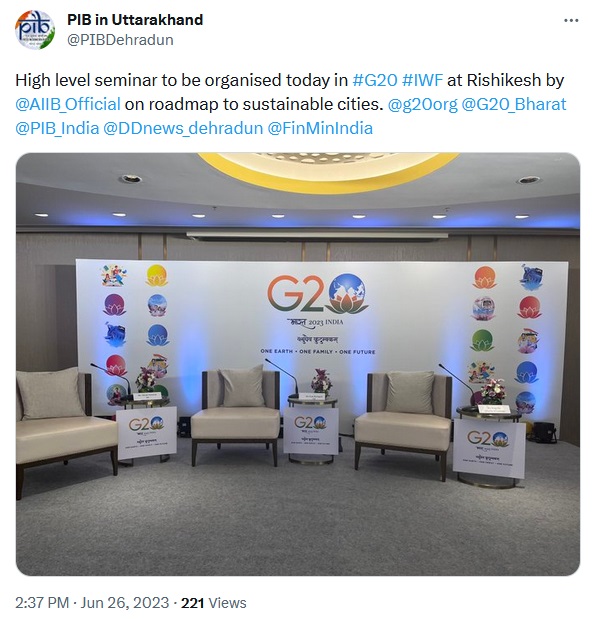To support policymakers in tackling the issue of sustainable and livable cities, the India G20 Presidency, in partnership with AIIB, is organizing a high-level Seminar on Creating Sustainable and Livable Cities on June 26, 2023 in Rishikesh, India.
An initiative of the G20 Infrastructure Group, the seminar will focus on how cities can use infratech to become “smarter” and how technology can facilitate the retrofitting of existing infrastructure. Notable speakers include Edward Glaeser, Chair, Economics Department, Harvard University; Mayor Atiqul Islam of Dhaka North, Bangladesh; and Pak Susantono, Chairman of NUSANTARA, the new capital city of Indonesia under construction.
The seminar will consist of three panel discussions. The first is a panel for G20 decision-makers to discuss with mayors, city executives and urban planners the main challenges they are currently facing, from climate change challenges to infrastructure resiliency, fast urbanization and inclusiveness. The second panel will explore the role of technology, infratech and digitization in helping address some of the challenges identified in the first panel. Finally, the third panel will provide a unique perspective about the launch of the city development of NUSANTARA in Indonesia.

Press Information Bureau, Government of India, @PIBDehradun, Twitter
In the lead up to the seminar, AIIB led discussions on “Old Cities, New Cities: the Role of Technology in Solving Tomorrow's Problem” at the G20 Infrastructure Working Group meeting in India. AIIB partnered with public policy graduate students from the University of Cambridge to identify main issues and possible policy solutions, with clear focus on how to leverage city assets to address ageing infrastructure and low carbon emissions objectives.
Building sustainable and livable cities is a major concern, what with the global city population share doubling from 25% in 1950 to about 50% in 2020 and projected to slowly increase to 59% over the next 50 years, with over five billion people living in cities by 2050.[1] This general trend towards more urbanization is, however, faster in lower-income countries, where it is expected that the number of people moving to cities will increase by 76% between 2020 and 2070. While the number of mega cities will continue to grow, small cities will represent about 45% of city land globally.[2]
This poses unique challenges in terms of planning, infrastructure build, and service delivery, to ensure that sprawl and human proximity do not result in an unsustainable future. Old cities face the unique challenge of having to retrofit their existing basic infrastructure to meet new challenges in becoming sustainable, environmentally friendly and resilient, while new city developments create more pressure on land and on nature ecosystems. While rapid geographic aggregation may bring more economic and social opportunities for people, it may also result in rapidly aginginfrastructure that lack the capacity to deliver critical services.
Infratech plays a critical role in helping increase the efficiency and productivity of old and new infrastructure. Infratech is used in existing urban developments and is at the core of the development of new cities. It helps better align power generation to power demand, hence resulting in less greenhouse gas emissions; it increases the efficiency of water distribution networks; it helps reduce transport congestion through smart traffic management. Smart urban infrastructure management brings service delivery closer to real needs, with the possibility of reducing the climate footprint. Digital connectivity increases the resilience of cities and fosters human connections. Its rise has led urban planners to make it an essential tool for planning, right-sizing, better infrastructure management and efficiency. Part of the discussions will be to look into whether this sufficient to address the immediate needs to climate change, livability and social equity in cities.
Against this backdrop, AIIB has identified financing infrastructure for the sustainable development of cities in Asia as a key priority through its Sustainable Cities Strategy. Through the Strategy, the AIIB aims to provide financing solutions, with distinct capabilities in supporting subnational entities and mobilizing private capital, for developing sustainable cities that are green, resilient, efficient, accessible and thriving (GREAT) in Asia. AIIB’s investment in cities are guided by the following principles including a focus on sustainability: client-driven, outcome-driven and financial viability-driven. Priority areas for infrastructure investment in cities under the Strategy are enhancing urban mobility, improving basic infrastructure and city resilience and promoting integrated development.
Agenda
[1] OECD, 2023, Financing Cities Report, published in cooperation with the G20.
[2] UN Habitat, 2022, World Cities Report, Chapter 2.


